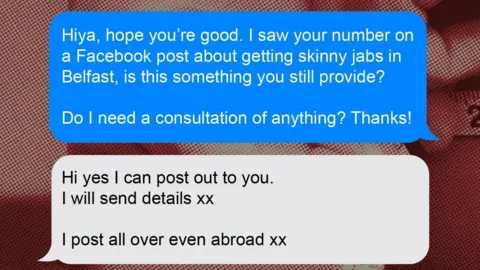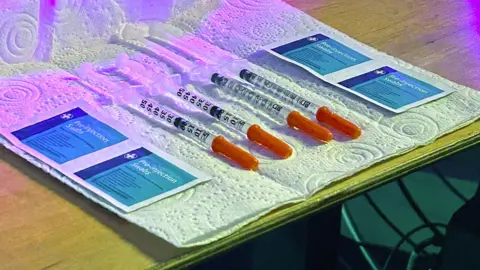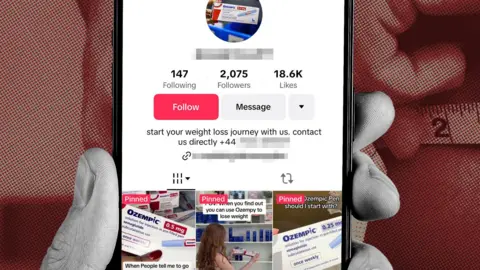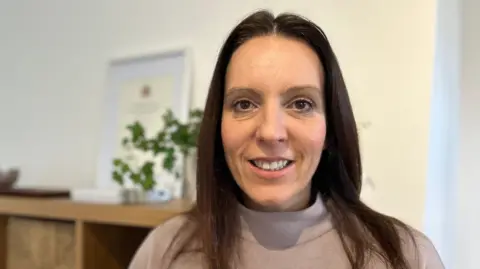Fake jabs being sent to NI via social media
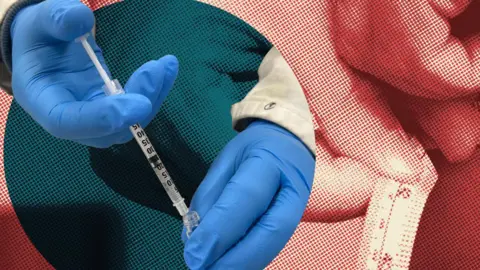 BBC
BBC
“Skinny jabs” are prescribed weight loss injections that work by making you feel fuller and less hungry
Illegal weight loss injections with dirty needles are being sold over social media and sent to people in Northern Ireland, a BBC investigation has found.
BBC News NI made test purchases of syringes which claimed to contain semaglutide, a prescription-only drug, via Facebook from sellers based in England.
When tested, the liquid was not semaglutide but did contain carnitine – a supplement that can be bought on the high street.
The Police Service of Northern Ireland (PSNI) said it was working at an international level to root out criminal gangs selling illicit jabs manufactured in unhygienic labs.
So-called skinny jabs are prescribed weight loss injections that work by making you feel fuller and less hungry.
In Great Britain, semaglutide is available on the NHS as part of a weight management programme.
However, in Northern Ireland it is not as there is no specialist weight management service.
But it is available on private prescription.
BBC News NI contacted a number posted on a Facebook post that said they would send “skinny jabs” in the post
The Department of Health in Northern Ireland said people were putting themselves at serious risk buying from sellers on social media sites.
The BBC purchased the alleged weight loss injections from an account on Facebook.
Four syringes, with needles attached, arrived wrapped in kitchen roll with no labels or guidance of what they contained.
Warning over dangers of fake weight loss injections
Prof Panagiotis Manesiotis, head of the School of Chemistry and Chemical Engineering at Queen’s University Belfast, screened two of the syringes.
“It is absolutely shocking that people are taking the risk to purchase pharmaceuticals like this in an injectable form off the internet,” he said.
“You don’t know whether you’re allergic to the content of it, you don’t know if it’s being manufactured in a clean way.
“Seeing how those samples arrived to me, I have serious concerns about health effects that they might have on the public.”
He added that the needles themselves could be a carrier for bacterial infections, and could cause sepsis, which is a condition that needs to be treated immediately and requires urgent care.
“It could ultimately result in someone’s death,” he said.
Health implications
The Department of Health said people should consider the implication of buying drugs online from dubious sources.
“There is no way of knowing what you are buying is what you think it is, and this can have serious consequences for your health,” the department said.
BBC News NI identified a number of social media accounts across multiple platforms promoting the availability of weight loss injections without prescription or medical supervision.
Following our investigation, TikTok and Telegram shut down accounts we engaged with for violating their policies on the trade of regulated goods and services.
Meta did not request the details of the user accounts.
The PSNI also warned people about buying drugs online without consulting a medical professional.
“These unregulated drugs are often produced in illicit, unhygienic laboratories and are made to look like the genuine product, meaning that they can be incredibly dangerous to take,” it added.
This TikTok account advertising weight loss injections has been shut down
What are social media companies doing?
TikTok told the BBC it did not the allow the trade or marketing of regulated, prohibited, or high-risk goods, including prescription drugs.
“In Q3 2024 we removed 96% of content found to violate these policies before it was reported to us,” a statement added.
The messaging service Telegram said the sale of prescription drugs is explicitly forbidden on its platform and is removed when discovered.
Adding it would “proactively monitor public parts of the platform and accept reports from users and organisations in order to remove millions of pieces of harmful content each day.”
Meta told the BBC: “We don’t allow the sale of pharmaceutical drugs on Instagram or Facebook and we remove content about weight loss that contains a miracle claim and attempts to buy, sell, trade, donate or gift weight loss products.”
Has anyone been prosecuted?
From 2022 to 2024, the Department of Health’s Medicines Regulatory Group (MRG) conducted 18 investigations focusing on the unlawful possession, advertisement and/or supply of counterfeit or unlicensed weight loss medicinal products.
To date, one person has been successfully prosecuted and a further four prosecutions are pending.
MRG has also issued 10 formal Advice and Warning letters, seized over 340 weight loss medicinal products and reported two persons to their professional regulatory bodies.
Julianne Dickenson, a dietician in south Belfast, said the problem was access to the medications
Julianne Dickenson, a dietician in south Belfast, said the problem was access to the medications.
“I’ve heard of people getting them from criminal gangs and social media,” she said.
“So, if something is a lot cheaper than normal, that’s a red flag.
“Try and check that your doctor is registered with the General Medical Council, that your pharmacy is registered, if you have any concerns always go and talk to your GP.”
She added that a collaborative approach was needed to tackle obesity.
“It is a chronic, relapsing and progressive disease,” she said.
“So everybody has to work together, it has to come from individuals, it has to come from communities, it has to come from schools, workplaces, food manufacturers, the NHS and the government.”
No Byline Policy
Editorial Guidelines
Corrections Policy
Source

